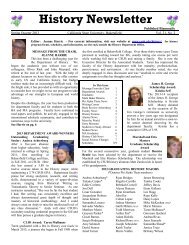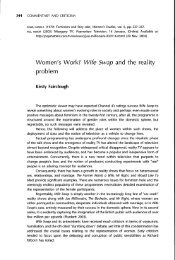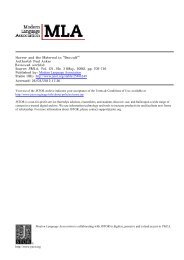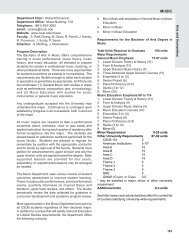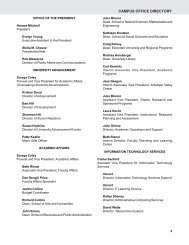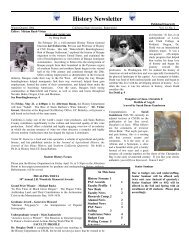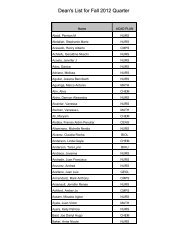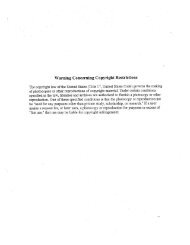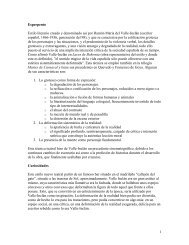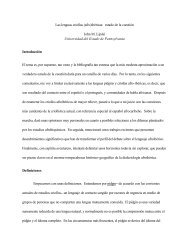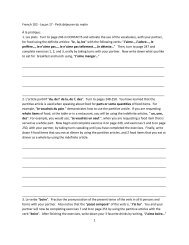''Don't Ask me, I'm Just a Girl'': Feminism, Female Identity, and The ...
''Don't Ask me, I'm Just a Girl'': Feminism, Female Identity, and The ...
''Don't Ask me, I'm Just a Girl'': Feminism, Female Identity, and The ...
You also want an ePaper? Increase the reach of your titles
YUMPU automatically turns print PDFs into web optimized ePapers that Google loves.
Don’t <strong>Ask</strong> <strong>me</strong>, I’m <strong>Just</strong> a Girl 281<br />
grow up in nontraditional families, that definition seems perfectly<br />
unfair. Whether by choice or circumstance, families co<strong>me</strong> in all<br />
shapes <strong>and</strong> sizes. Ultimately, what really defines a family is commit<strong>me</strong>nt,<br />
caring, <strong>and</strong> love. (Kubasik)<br />
<strong>The</strong>n, in a scene that beautifully blurs the distinctions between reality<br />
<strong>and</strong> fiction, Murphy Brown, a fictional character, is joined in the fictional<br />
FYI studio by a group of real-life single-parent families who, she<br />
tells the audience, ‘‘might not fit into the Vice President’s vision of a<br />
family, but consider themselves families nonetheless.’’ Despite the<br />
‘‘<strong>me</strong>dia circus’’ surrounding these events, the A<strong>me</strong>rican viewing public<br />
was obviously interested in watching this debate unfold: bolstered<br />
largely by the controversy, the season premiere of Murphy Brown pulled<br />
in 44 million viewers (‘‘Murphy to Dan’’).<br />
Unlike Murphy Brown, who had the ‘‘luxury’’ of a man in her life<br />
(however intermittently) <strong>and</strong> whose pregnancy was the result of a<br />
sexual encounter with him, Selma Bouvier has to work at finding a<br />
suitable partner <strong>and</strong> potential father; however, for a woman of her age<br />
<strong>and</strong> in her circumstances in A<strong>me</strong>rican culture, this is still a daunting<br />
prospect. In a brilliant montage demonstrating the various <strong>me</strong>ans by<br />
which both Selma <strong>and</strong> Patty attempt to secure dates, <strong>The</strong> Simpsons offers<br />
a critique of the lingering sexist attitudes in the culture, including<br />
those regarding wo<strong>me</strong>n’s personal hygiene <strong>and</strong> how readily they will<br />
‘‘put out’’ on a date. <strong>The</strong> sexism is perhaps most powerfully highlighted<br />
by Patty’s use of a relatively ‘‘modern’’ <strong>me</strong>thod of finding a<br />
man: the video-dating service. In a particularly pointed satirical mo<strong>me</strong>nt,<br />
we see Groundskeeper Willie (no prize himself in his 1970s era<br />
outfit <strong>and</strong> gold chains) viewing video profiles <strong>and</strong> then harshly dismissing<br />
Patty with the quip ‘‘Back to the loch with you, Nessie.’’<br />
Although a small mo<strong>me</strong>nt, it aptly demonstrates the show’s critique of<br />
the culture’s continued emphasis upon a woman’s appearance as the<br />
singular <strong>me</strong>asure of her worth.<br />
As in ‘‘Principle Charming,’’ we see that there are no decent prospects<br />
available for Selma or Patty. When Selma again beco<strong>me</strong>s dejected,<br />
Lisa wisely suggests a very contemporary alternative—the<br />
sperm bank. Determined to have a baby, Selma goes to the Springfield<br />
Sperm Bank for more information. However, this too does not seem to<br />
provide the answer Selma is looking for. She returns ho<strong>me</strong> with a<br />
brochure entitled ‘‘101 Frozen Pops,’’ a catalog of ‘‘celebrity sperm,’’



